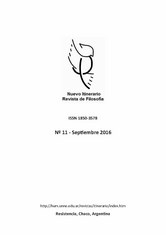The theory of décadence in the Essais de psychologie contemporaine by Paul Bourget: about normal-pathological and its manifestations in Madame Bovary
DOI:
https://doi.org/10.30972/nvt.1927002Keywords:
decadence, modern culture, psychological analysis, illness-health, NietzscheAbstract
Within the framework of the new French literary criticism, Paul Bourget publishes the Essais de psychologie contemporaine (1883) and the Nouveaux essais de psychologie contemporaine (1885). The purpose pursued with these works is to reconstruct the moral state of French society in the second half of the 19th century. The investigation reveals that the new French generations suffer from a mortal fatigue of living, a realization of the absence of meaning. Among the causes of this, Bourget identifies the pessimistic influence that each of the ten authors studied in the Essais and the Nouveaux essais exerts with their literature on young French people. The analysis of each one of these authors shows that they are all immersed in the same process that is fundamental in the constitution of their sensibilities: la décadence. Within this context, the objective of this paper is to develop the theory of decadence formulated by Paul Bourget. To this end, the study will be divided into two parts: in the first part, the notion of décadence and its positivist conceptual assumptions about the normal and the pathological will be presented. In the second part, a description of the character of Emma Bovary from Madame Bovary will be made in order to show a case of romantic idealization that constitutes a concrete manifestation of decadence.
References
Bernard, C. (1858). Leçons sur les propriétés physiologiques et les altérations pathologiques des liquides de l'organisme. Vol. 2. Paris: J. B. Bailliére.
Bernard, C. (1876). Leçons sur le chaleur animale. Paris: J. B. Bailliére.
Bernard, C. (1877). Leçons sur le diabete. Paris: J. B. Bailliére.
Bernard, C. (1938). Philosophie, manuscrit inedit. (J. Chevalier, Ed.). París: Boivin.
Bourget, P. (1883). Essays de psychologie contemporaine. Paris: Lemere.
Bourget, P. (1885). Nouveaux essais de psychologie contemporaine. Paris: Lemerre.
Bourget, P. (2008). Baudelaire y otros estudios críticos. (S. Sánchez, Trad. y Ed.) Córdoba: Ediciones del Copista.
Bourget, P. (1894). Lettre autobiographique. En Van Daell, A (Ed.). Extraits choisis des oeuvres de Paul Bourget (pp. 1-15). Boston: Ginn & Company.
Bourget, P. (1881). Psychologie Contemporaine. Notes et portraits. Charles Baudelaire. La Nouvelle Revue, T. 13, pp. 398-416.
Broussais, F. (1822). Traité de psysiologique appliquée a la pathologi. Paris: Delaunay.
Campioni, G. (2004). Nietzsche y el espíritu latino. (S. Sánchez, Trad.). Buenos Aires: El Cuenco del Plata.
Canguilhem, G. (2015). Lo normal y lo patológico. (R. Potschart, Trad.). México: Siglo XXI.
Comte, A. (1851). Système de politique positive, ou traité de sociologie, instituant la religión de l’humanité. Vol. I. Paris: Carilian-Goeury.
Comte, A. (1869). Cours de philosophie positive. La philosophie chimique et la philosophie biologique. T. III. Paris: Bailliére et fils.
Flaubert, G. (2015). Madame Bovary. (M. Armiño, Trad.). Buenos Aires: Penguin Clásicos.
Nietzsche, F. (2009). Digitale Kritische Gesamtausgabe Werke und Briefe. (Paolo D’Iorio, Ed.). Paris: Nietzsche Source. https://www.nietzschesource.org/#eKGSWB.
Nietzsche, F. (2016). Fragmentos póstumos IV (1885-1889). (D. Sánchez Meca, Ed.; J. L. Vermal y J. B. Llinares, Trad. Madrid: Tecnos.
Renan, E. (1890). L’avenir de la science. Pensées de 1848. Paris: Calmann-Lévy. París.
Ribot, T. (1909). Psychologie. De la méthode dans les sciences, n° 1, pp. 229-257.
Volpi, F. (2012). El nihilismo. (C. del Rosso y A. G. Vigo, Trads.). Madrid: Siruela.
Downloads
Published
How to Cite
Issue
Section
License

This work is licensed under a Creative Commons Attribution-NonCommercial 4.0 International License.
Les autores ceden a Nuevo Itinerario los derechos de publicidad de sus trabajos, toda vez que hayan sido admitidos como parte de alguno de sus números. Ello no obstante, les autores retienen los derechos de propiedad intelectual y responsabilidad ética así como la posibilidad de dar difusión propia por los medios que consideren.












51.jpg)

